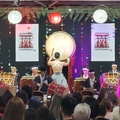Is your name compound? You can spell it? Do you only have a last name? These are some of the questions I've heard about my name that, over the years, have left me intrigued. Now comes the time when I come to make observations about Brazilian Nikkei names, with their particular characteristics that deserve to be explained.
I warn you that this text is not intended to be a scientific study, but rather to approach the topic in a curious and humorous way. Therefore, I hope that whoever reads it will identify with it or, at least, will be able to obtain some clarification.
Composite name?
A very common question among non-Japanese descendants is whether my name Tatiana Akemi, like that of many other Nikkei , is a compound, like, for example, the Brazilian names Maria Alice and João Pedro.
In fact, it is just a custom for parents to choose a non-Japanese name and a Japanese name for their children. And it seems to me that it ends up passing from generation to generation – from grandparents to parents and from parents to grandchildren – naturally. That is, my parents and I have names like that, and my children will also be called by two names.
Just a first and last name
Although there is this tradition of the “double” name, many descendants have only one name and a surname, which is usually the family name on their father's side. It would be the case if my name was just Tatiana Maebuchi.
Many names!
Another “phenomenon” that can be observed is that Brazilian Nikkei have four names. Yes, four! My mother, for example, has a first name of Hebrew origin, a Japanese name, my maternal grandfather's surname (who was Nisei ) and my father's family surname, Maebuchi, which she added when she got married.
Two surnames
Often, those who are partly of Japanese descent and partly of other nationalities have two surnames: maternal and paternal. An example would be if, hypothetically, I had another ancestry besides Japanese and added that surname after Akemi.
You can spell it?
A situation that the vast majority of Brazilian Nikkei have probably experienced is needing to spell their surname, whether on a phone call to schedule a doctor's appointment or a bank appointment. And even so, it was a disappointment to discover that whoever registered your name messed up and got a few letters wrong.
To avoid confusion, I got into the habit of saying my name and then “I’ll spell it” before anyone even asked me. “M for Mary, A... E for school, B for ball, U for bear, C for dog... H, I for church.” The phrase spelling (or “act of spelling”) has been on the tip of our tongues for some time now. But almost always, when confirming, the attendant either speaks with several pauses, hesitantly (“Ma... e... bu... chi?”) – then we celebrate – or pronounces it wrongly (“Maiebuchi”) – then We corrected it, hoping to get it right next time.
This happened when there was no electronic support via chat or WhatsApp. I imagine that not only me, but also those people who deal with the public, are immensely grateful for the creation and use of technologies to our advantage! [laughter]
Can I call you like that?

I've been called Tati, Tá, Tatiana, Tatiane, Tati Quebra Barraco (funk singer who was successful in the early 2000s) and other nicknames. Within the community of descendants and in the classes I took at nihongakkou , they called me Tatiana-san (which sounded strange), Maebuchi-san (which, because it was extremely formal, sounded even stranger), Akemi or Akemi-chan (I got used to it with time).
In professional life, I use my first name and my last name. It's not long and identifies me. In my personal life, I call myself Tati Akemi, because I am that Tati, the descendant of Japanese. For me, my name Akemi represents my Nikkei identity and, therefore, it is not necessary to use my family name, which is a little more complicated to read and pronounce by non-Brazilian descendants.
Although the names Tatiana and Akemi have a contrast in terms of origin (Tatiana is Russian), their joint use in Brazil is relatively common. The first time I realized this was during the entrance exam, when I saw that there were several other women on the list of candidates who also called themselves that. Nowadays, I sometimes find this combination of names on social media profiles.
Alphabet soup
Finally, it is worth highlighting that I consider the ability to adapt to be an important characteristic of immigrants and their descendants, because it was thanks to this that they settled in the country.
We could say, then, that we adapt to the circumstances and the names by which we are called. Even if a word turns into a salad, or rather, an alphabet soup. It's up to us to make the best of these occasions and, of course, turn them into good stories.
© 2023 Tatiana Maebuchi





